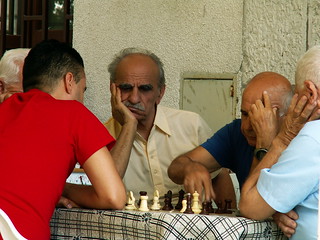Adopting from Bosnia and Herzegovina
Notice: As of July 14, 2014, all individuals and agencies facilitating international adoptions must be in compliance with the Intercountry Universal Accreditation Act.
Contents
Hague Convention Information
Bosnia and Herzegovina is not party to the Hague Convention on Protection of Children and Co-operation in Respect of Intercountry Adoption(Hague Adoption Convention). Intercountry adoptions of children from non-Hague countries are processed in accordance with 8 Code of Federal Regulations, Section 204.3 as it relates to orphans as defined under the Immigration and Nationality Act, Section 101(b)(1)(F).
While there is nothing in Bosnian law that specifically prohibits foreigners from applying to adopt a Bosnian child, the law stresses that there must be overwhelming justification and exceptionally compelling reasons for a foreigner to be permitted to do so. The definition of "overwhelming justification" is judged on a case-by-case basis. The law says specifically that a foreign citizen may be an adoptive parent "if the adoption is in the best interest of the child and if the child cannot be adopted in Bosnia and Herzegovina.”
Bosnia and Herzegovina have two distinct procedures for adoption: a full adoption implies a permanent relationship between the adopted child and adopting parents equal to a blood relationship. Only a child up to the age of 10 can be adopted fully. Partial adoption implies all the rights and duties that exist between the adopting parents and adopted children under the law, although it does not affect the rights and duties of the adopted child and his/her biological parents and other relatives. A partial adoption does not irrevocably terminate the biological parent(s) – child relationship and, therefore, a partial adoption is not an adoption for U.S. immigration purposes.
Who Can Adopt
In addition to U.S. immigration requirements, you must also meet the following requirements in order to adopt a child from Bosnia and Herzegovina:
Residency
While Bosnian law does not specifically prohibit foreigners from applying to adopt a Bosnian child, it does stress that there must be overwhelming justification and exceptionally compelling reasons for a foreigner to be permitted to do so. The definition of "overwhelming justification" is judged on a case-by-case basis. The law says specifically that a foreign citizen may be an adoptive parent "if the adoption is in the best interest of the child and if the child cannot be adopted in Bosnia and Herzegovina.”
Age of Adopting Parents
Prospective adoptive parents must be between 25 and 45 years old and must be at least 18 years older than the child. If there are justified reasons, a prospective adoptive parent may be older than 45, but the age difference between the parent and child must not be greater than 45 years.
Marriage
In addition to married couples, common-law marriage partners who have lived together for at least 5 years or single prospective adoptive parents may adopt; however, the latter cases are the exception. Bosnia and Herzegovina law does not provide for the possibility of adoption by LGBT persons or same sex couples.
Income
This is not specified in the Family Law, however, it is considered by Social Services Centers when they conduct the home study.
Other
Persons falling into any of the following groups are prohibited from adopting Bosnian children: persons whose parental rights have been taken away; persons with a limited or no ability to work; persons who provide insufficient guarantees that they will raise the child correctly; persons who are mentally ill, or suffering from any illness that could endanger the health and life of the adopted child; relatives of the first bloodline.
Who Can Be Adopted
In addition to U.S. immigration requirements, Bosnia and Herzegovina has specific requirements that a child must meet in order to be eligible for adoption:
Relinquishment: For adoption, the approval of both or one parent, if there is only one parent, is required. The parent(s) must state specifically whether he/she agrees to full or partial adoption. (Please see the top of this country information sheet for information on full and partial adoptions.)
Abandonment: A child whose parents are unknown may be adopted only after 3 months have passed since his/her abandonment.
Age of Adoptive Child: A child less than three months old cannot be adopted. A child of parents who are minors cannot be adopted under the age of one and may only be adopted after he/she reaches the age of one if there are no family members who may be able to raise the child. Only a child up to the age of 10 can be adopted fully. A child up to the age of 18 can be adopted partially. Children older than age 10 must give their approval for the adoption.
Sibling Adoptions: If possible, the centers for social work will facilitate sibling adoptions.
Caution: Prospective adoptive parents should be aware that not all children in orphanages or children’s homes are adoptable. In many countries, birth parents place their child(ren) temporarily in an orphanage or children’s home due to financial or other hardship, with the intention of returning for the child when they are able to do so. In such cases, the birth parent(s) rarely would have relinquished their parental rights or consented to their child(ren)’s adoption.
How to Adopt
Adoption Authority
Bosnia and Herzegovina’s Adoption Authority
Bosnia and Herzegovina consists of two entities: the Federation of Bosnia and Herzegovina and Republika Srpska. Family law governing adoption is within the competence of those entities, and, therefore, two ministries mentioned below are the adoption authorities for the relevant entity.
FOR FEDERATION OF BOSNIA AND HERZEGOVINA:
Ministry of Labor and Social Policy of the Federation of Bosnia and Herzegovina.
FOR REPUBLIKA SRPSKA
Ministry of Health and Social Welfare of the Republika Srpska.
Please note that in Brcko District cases, the decision on adoptions by foreign citizens is the responsibility the District’s Department of Health, Sub-Division for Social Welfare. This department is equivalent to a ministry in the entities.
The Process
The process for adopting a child from Bosnia and Herzegovina generally includes the following steps:
- Contact a Social Services Center in Bosnia and Herzegovina
- Apply to be found eligible to adopt
- Be matched with a child
- Adopt the child in Bosnia and Herzegovina
- Apply for the child to be found eligible for orphan status
- Bring your child home
1. Contact a Social Services Center in Bosnia and Herzegovina
The recommended first step in adopting a child from Bosnia and Herzegovina is to contact a Social Services Center in country. There are no U.S. adoption agencies operating in Bosnia and Herzegovina. Prospective adoptive parents may contact the Social Services Center in the area where they plan to adopt directly. However, U.S. citizens considering adopting from Bosnia and Herzegovina may choose to work with a U.S. adoption agency to assist them with the U.S. portions of the process. The U.S. Embassy in Sarajevo also maintains a list of attorneys that may be useful. Prospective adoptive parents may contact the Embassy directly for a copy of that list.
2. Apply to be Found Eligible to Adopt
In order to adopt a child from Bosnia and Herzegovina; you will need to meet the requirements of the Government of Bosnia and Herzegovina and U.S. immigration law. You must submit an application to be found eligible to adopt with the municipal Center for Social Work of Bosnia and Herzegovina. A home study conducted by the municipal Center for Social Work is required in all adoptions. You must also file an I-600A, Application for Advance Processing of an Orphan Petition with U.S. Department of Homeland Security’s U.S. Citizenship and Immigration Services to be found eligible and suitable to adopt.
3. Be Matched with a Child
If you are eligible to adopt, and a child is available for intercountry adoption, the central adoption authority or other authorized entity in Bosnia and Herzegovina will provide you with a referral. Each family must decide for itself whether or not it will be able to meet the needs of and provide a permanent home for a particular child. The child must be eligible to be adopted according to Bosnia and Herzegovina’s requirements, as described in the Who Can be Adopted section. The child must also meet the definition of an orphan under U.S. immigration law.
4. Adopt (or Gain Legal Custody of) a Child in Bosnia and Herzegovina
The process for finalizing the adoption (or gaining legal custody) in Bosnia and Herzegovina generally includes the following: Prospective adoptive parents who wish to apply to adopt a particular child can do so by contacting the Center for Social Work of the municipality/district in which the child is a resident and submitting the documents listed below. [Note: The Center for Social Work is the Bosnian equivalent of the county or municipal social services department in the United States.] Prospective adoptive parents who do not have a particular child in mind can contact the Center for Social Work for a designated area to inquire if there are any children eligible for adoption.
If the Center affirms that a child is eligible for adoption, the Center will request the documents listed below to determine the eligibility of the prospective adoptive parent(s). It should be noted that Bosnian law gives absolute priority in adoption to citizens of Bosnia and Herzegovina who live in Bosnia and Herzegovina. Citizens of Bosnia and Herzegovina who live abroad are potentially eligible, and foreign citizens only exceptionally (typically when there is a compelling medical need and the Social Work Center assesses that the child could get better care abroad).
Once the Center reaches a decision, they forward the application package to the appropriate entity’s adoption authority with their recommendation. The Ministry is supposed to reach a decision about a request for adoption within two months. Once the Ministry makes a decision, it is sent back to the Center that accepted the application. If the decision is favorable, the prospective adoptive parents must be personally present at the official ceremony (act) of adoption. This is an official act signed by the adoptive parents in person and representatives of the government. It takes place at the Center for Social Work. The court then issues an official decision or decree ratifying the proceedings conducted by the Center for Social Work. The court does not have the authority to overrule the Ministry's decision.
- Role of Adoption Authority: The entity Ministry will make the final decision, upon the referral (proposal) of the Center for Social Work.
- Role of the Court: The court will issue an official decree ratifying the proceedings conducted by the Center for Social Work.
- Role of Adoption Agencies: There are no U.S. adoption agencies operating in Bosnia and Herzegovina.
- Adoption Application: There is no specific application form. Prospective adoptive parent(s) must write a signed letter to the relevant Center for Social Work providing basic information about themselves. It may be submitted by mail or through an authorized representative.
- Time Frame: It can take several years for a prospective adoptive parent to be matched with a child. After both the prospective adoptive parents and the child have met the requirements for adoption, the child and the prospective adoptive family have an adaptation period of six months. This is mandatory and must take place on the territory of Bosnia and Herzegovina. During this time, a social worker visits the family regularly. In cases involving children with special needs, who need special medical care, exceptions to this rule may be made but on a case by case basis. Only after the assessment of the social worker is complete will the final decision on adoption be made.
- Adoption Fees: None
- Documents Required: The application must be accompanied by the following documents about each of the adoptive parents:
- 1. Certified Birth certificate;
- 2. Certified Marriage certificates (if applicable). Medical certificate of good health, preferably provided by a hospital or general practice clinic, rather than a private physician;
- 3. Proof of citizenship (naturalization certificate, certified copy of a birth certificate, or passport);
- 4. Police certificate (i.e., certificate that no criminal record exists) issued by local law enforcement authorities from every place of residence where the applicant has lived for more than a year since the age of 18;
- 5. Court certificate (i.e., certificate proving that the prospective adoptive parent is not under any court investigation at the present time);
- 6. Certificate about capacity for gainful employment. This should take the form of a resume of previous employment records, and an original letter (on official stationery) signed by the current employer, stating the job title, if the position is full- or part-time, how long the person has been employed and the salary;
- 7. Certificate proving that the prospective adoptive parent has never been charged with child neglect or abuse. This may take the form of an official letter from the local department of child welfare;
- 8. Documents identifying the prospective adoptive parent's income and property;
- 9. Home study (social worker's analysis) about the prospective adoptive family, including its ability to care for a child. For non-Bosnian applicants, including Americans, the social services department of the applicant's country must conduct the study. All original documents and the application letter must be in English and each must be accompanied by a translation into Bosnian/Serbian/Croatian with a certified translation. The U.S. Embassy in Sarajevo can provide a list of court translators. The Embassy itself cannot, however, do the translations.NOTE: Additional documents may be requested.
- 10. Authentication of Documents: The United States and Bosnia and Herzegovina are parties to the Hague Apostille Convention. U.S. public documents may be authenticated with Apostilles by the appropriate U.S. Competent Authority.
5. Apply for the Child to be Found Eligible for Orphan Status
After you finalize the adoption (or gain legal custody) in Bosnia and Herzegovina, the Department of Homeland Security, U.S. Citizenship and Immigration Services must determine whether the child meets the definition of orphan under U.S. law. You will need to file a Form I-600, Petition to Classify Orphan as an Immediate Relative.
6. Bring Your Child Home
Once your adoption is complete (or you have obtained legal custody of the child), you need to apply for several documents for your child before you can apply for a U.S. immigrant visa to bring your child home to the United States:
- 1. Birth Certificate
If you have finalized the adoption in Bosnia and Herzegovina you will first need to apply for a new birth certificate for your child. Your name will be added to the new birth certificate.
If you have been granted custody for the purpose of adopting the child in the United States, the birth certificate you obtain will, in most cases, not yet include your name.
In order to obtain a new birth certificate for your child, take the adoption decree and the child's original birth certificate to the Municipality - Registrar's Office in the town where the child was born (where his/her original birth certificate was issued). The adoptive parent's marriage certificate and identification cards (or passports) are required.
- 2. Bosnia and Herzegovina Passport
Your child is not yet a U.S. citizen, so he/she will need a travel document or passport from Bosnia and Herzegovina.
To apply for a Bosnia and Herzegovina Passport, adoptive parents will need to apply with the office of the cantonal Ministry of Interior. The required documents include:
- Child's birth certificate not older than 6 months;
- Parents’ I.D.’s or passports;
- Payment of KM 40;
- Old passport, if applicable;
- Passport application can be submitted in person only; the child has to be present as well; both parents have to sign the application and present their I.D. cards or passports at that time.
The legal deadline for issuance of a passport from the day of application is 30 days; in practice, it usually takes about two weeks.
- 3. U.S. Immigrant Visa
After you obtain the new birth certificate and passport for your child and you have filed Form I-600, Petition to Classify Orphan as an Immediate Relative, you then need to apply for a U.S. immigrant visa for your child from the United States Embassy in Sarajevo. This immigrant visa allows your child to travel home with you. As part of this process, the Consular Officer must be provided the Panel Physician’s medical report on the child.
You can find instructions for applying for an immigrant visa on the Sarajevo Embassy website.
Child Citizenship Act
For adoptions finalized abroad prior to the child’s entry into the United States: A child will acquire U.S. citizenship upon entry into the United States if the adoption was finalized prior to entry and the child otherwise meets the requirements of the Child Citizenship Act of 2000.
For adoptions finalized after the child’s entry into the United States: An adoption will need to be completed following your child’s entry into the United States for the child to acquire U.S. citizenship.
Please be aware that if your child did not qualify to become a citizen upon entry to the United States, it is very important that you take the steps necessary so that your child does qualify as soon as possible. Failure to obtain citizenship for your child can impact many areas of his/her life including family travel, eligibility for education and education grants, and voting.
Read more about the Child Citizenship Act of 2000.
Traveling Abroad
Applying for Your U.S. Passport
U.S. citizens are required by law to enter and depart the United States on a valid U.S. passport. Only the U.S. Department of State has the authority to grant, issue, or verify U.S. passports. Getting or renewing a passport is easy. The Passport Application Wizard will help you determine which passport form you need, help you to complete the form online, estimate your payment, and generate the form for you to print—all in one place.
Obtaining a Visa to Travel to Bosnia and Herzegovina
In addition to a U.S. passport, you may also need to obtain a visa. A visa is an official document issued by a foreign country that formally allows you to visit. Where required, visas are affixed to your passport and allow you to enter a foreign nation. To find information about obtaining a visa for Bosnia-Herzegovina, see the Department of State’s Country Specific Information.
Staying Safe on Your Trip
Before you travel, it is always a good practice to investigate the local conditions, laws, political landscape, and culture of the country. The Department of State provides Country Specific Information for every country of the world about various issues, including the health conditions, crime, unusual currency or entry requirements, and any areas of instability.
Staying in Touch on Your Trip
When traveling during the adoption process, we encourage you to enroll your trip with the Department of State. Enrollment makes it possible to contact you if necessary. Whether there is a family emergency in the United States or a crisis in Bosnia and Herzegovina, enrollment assists the U.S. Embassy or Consulate in reaching you. Enrollment is free and can be done online via the Smart Traveler Enrollment Program (STEP).
After Adoption
We strongly urge you to comply with Bosnia and Herzegovina’s post-adoption requirements in a timely manner. Your adoption agency may be able to help you with this process. Your cooperation will contribute to that country’s positive experiences with American parents.
Post-Adoption Resources
Many adoptive parents find it important to find support after the adoption. There are many public and private nonprofit post-adoption services available for children and their families. There are also numerous adoptive family support groups and adoptee organizations active in the United States that provide a network of options for adoptees who seek out other adoptees from the same country of origin. Take advantage of all the resources available to your family -- whether it is another adoptive family, a support group, an advocacy organization, or your religious or community services.
Here are some places to start your support group search:
Child Welfare Information Gateway
North American Council on Adoptable Children
Adoption Services Support Groups for Adopting Persons
NOTE: Inclusion of non-U.S. government links does not imply endorsement of contents.
Contact Information
U.S. Embassy in Bosnia and Herzegovina
Address: 1 Robert C. Frasure Street, 71000 SARAJEVO Tel: +387 33 704-000 Fax: +387 33 221-837 Email: rws@state.gov Internet: U.S. Embassy in Bosnia and Herzegovina
Bosnia and Herzegovina’s Adoption Authority
FOR FEDERATION OF BOSNIA AND HERZEGOVINA:
Ministarstvo rada i socijalne politike Federacije Bosne i Hercegovine Ministry of Labor and Social Policy of the Federation of Bosnia and Herzegovina) Address: Vilsonovo setaliste 10, 71000 Sarajevo, Bosnia and Herzegovina Tel: +387 33 661 782 Fax: +387 33 661 783 Email: info@fmrsp.gov.ba Internet: Ministry of Labor and Social Policy Bosnia and Herzegovina
FOR REPUBLIKA SRPSKA
Ministarstvo zdravlja i socijalne zastite Republike Srpske (Ministry of Health and Social Welfare of the Republika Srpska) Address: Trg Republike Srpske 1, 78000 Banja Luka Tel: +387 51 339 486 Fax: +387 51 339-652 Email: ministarstvo-zdravlja@mzsz.vladars.net Internet: Ministry of Health and Social Welfare of the Republika Srpska
Embassy of Bosnia and Herzegovina
Address: 2109 E Street NW, Washington, DC 20037 Tel: (1 202) 337-1500 Fax: (1 202) 337-1502 Email: info@bhembassy.org Internet: Embassy of Bosnia and Herzegovina
Bosnia and Herzegovina also has a consulate in Chicago, Ill.
Office of Children’s Issues
U.S. Department of State 2201 C Street, N.W. SA-29 Washington, DC 20520 Tel: 1-888-407-4747 Email: AskCI@state.gov Internet: U.S. Department of State
U.S. Citizenship and Immigration Services (USCIS)
For questions about immigration procedures: National Customer Service Center (NCSC) Tel: 1-800-375-5283 (TTY 1-800-767-1833) Internet: USCIS
For questions about filing a Form I-600A or I-600 petition:
National Benefits Center
Tel: 1-877-424-8374 (toll free); 1-816-251-2770 (local)
Email: NBC.Adoptions@DHS.gov
SOURCE
Intercountry Adoption, Bureau of Consular Affairs. U.S. Department of State Country Information [1]











